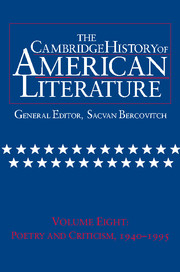Book contents
- Frontmatter
- Introduction
- Poetry, Politics, and Intellectuals
- Criticism since 1940
- Introduction
- 1 Politics and American Criticism
- 2 The Emergence of Academic Criticism
- 3 The Nationalizing of the New Criticism
- 4 The Canon, the Academy, and Gender
- 5 Deconstruction and Poststructuralism
- 6 From Textuality to Materiality
- 7 Cultural and Historical Studies
- Conclusion: Academic Criticism and its Discontents
- Appendix II: Biographies of Critics
- Chronology 1940–1995
- Bibliography
- Index
7 - Cultural and Historical Studies
from Criticism since 1940
Published online by Cambridge University Press: 28 March 2008
- Frontmatter
- Introduction
- Poetry, Politics, and Intellectuals
- Criticism since 1940
- Introduction
- 1 Politics and American Criticism
- 2 The Emergence of Academic Criticism
- 3 The Nationalizing of the New Criticism
- 4 The Canon, the Academy, and Gender
- 5 Deconstruction and Poststructuralism
- 6 From Textuality to Materiality
- 7 Cultural and Historical Studies
- Conclusion: Academic Criticism and its Discontents
- Appendix II: Biographies of Critics
- Chronology 1940–1995
- Bibliography
- Index
Summary
Determining how cultural practices work in specific social contexts has been a principal object of the recent critical projects known as “cultural studies” and “the new historicism.” These terms now designate an exceptionally broad, often interlocking array of inquiries that make use of the critical theories and methods we have discussed in our last three chapters.
It may be debated whether cultural studies and new historicism should be seen as parallel, overlapping, or antithetical developments. To some critics, these terms designate two faces of the same oppositional impulse. To others, they represent diametrically opposed practices – with “cultural studies” being politically oppositional and materialist, and “new historicism” defusing or precluding oppositional politics by relentlessly textualizing history or implicating all cultural production in hegemonic power. In this contrastive usage, “cultural studies” and “new historicism” often boil down to code terms for Marx and Foucault, the one seeking the material transformation of society, the other seeing “power” as so pervasive and insidious that would-be resistance only reproduces it.
Generally, though, cultural studies and the new historicism can be neither simply identified nor neatly opposed. Instead of a polar opposition, these terms mark different emphases among a fluid range of theories and practices that so interact, overlap, and mingle that the taxonomy finally becomes of limited value. Nonetheless, the characteristic emphases of the two movements do differ in ways that reflect their diverse origins. Cultural studies began in England as a critique of postwar British society by neo-Marxist intellectuals and activists who were particularly concerned with class relations and material culture, who favored empirical analysis over theoretical abstraction, and who generally worked between or beyond traditional academic disciplines and outside the elite British universities.
- Type
- Chapter
- Information
- The Cambridge History of American Literature , pp. 415 - 444Publisher: Cambridge University PressPrint publication year: 1996

